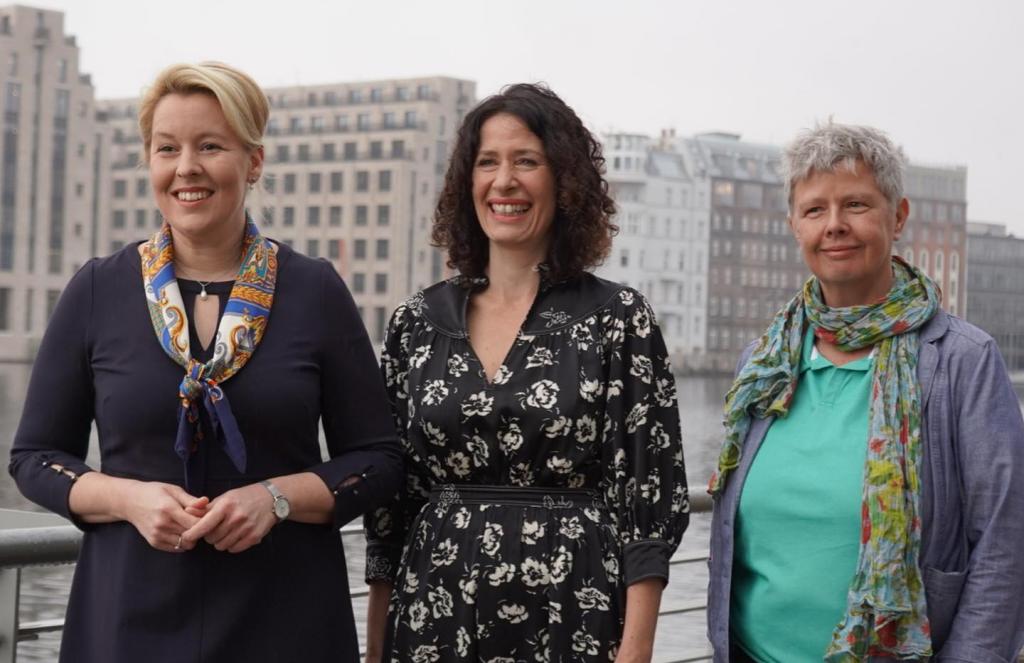Thessaloniki gets ready for its metro launch in November
The underground rapid transit lines have been under construction for almost two decades due to various project delays
 TheMayor.EU logo
TheMayor.EU logo 
L-R: Franziska Giffey (SPD), Bettina Jarasch (Greens) and Katina Schubert (Die Linke), Source: The Green Party, Berlin on Facebook
The new red-green-red coalition wants to redirect the city’s focus towards two main goals – fight against poverty and fight against climate change
Today, after five weeks of intense negotiations, the new coalition agreement for the local government in Berlin was finally negotiated and announced. During a press conference around noon, leaders from the Social Democratic Party (SPD), The Greens and The Left (Die Linke) announced the terms of the agreement.
Now, all that is left is for the document to pass at each party congress and in the State Senate, which is a very likely outcome, considering pretty much everyone got what they wanted. In any case, the Senate vote will be held on 21 December, whereas party congresses will take place in the first two weeks of next month.
According to the agreement, the SPD’s candidate Franziska Giffey will be the new mayor. The Greens will get the Finance Department and have control over climate spending, while The Left, coupled with the SPD, will get their housing bill with a commitment to build 20,000 new homes to curb the housing shortage in the city.
The new agreement and subsequent policy shift for Berlin can be described with two complementary concepts: fight against poverty and fight against climate change.
The first point of the agreement is directed towards providing homes for the homeless, coupled with a more robust package of social services to help those in need living with underlying conditions. A new and revamped social safety net should also help citizens avoid homelessness altogether.
The second project calls for the construction of 200,000 apartments by 2030. Another project aiming for 2030 is climate-neutral Berlin, bundling climate innovation, a broad-based solar energy campaign and a gradual coal phase-out.
On the topic of mobility, the new coalition wants to expand the subway with five additional lines in the next eight years and increase the viability of electric vehicles through charging stations. At the same time, the mobility plan is boosted by the innovations, industry and crafts plan to make Berlin a hotbed of innovation in a wide variety of sectors.
To help attract talent and ensure workers compensation, the coalition calls for a rise of the minimum wage to 13 euros per hour, coupled with an increase in apprenticeships in state-owned companies.
Hospitals will also get an increased budget. In terms of education, the new administration wants to maintain the current school building campaign and digitalisation programme, while raising the university research and science grants by 3.5% annually.
Finally, the agreement also calls for an increase in police staff to be able to ensure citizen safety while offering administrative services to everyone. Acceding to the document, each Berliner should be able to schedule an appointment within 14 days.

The underground rapid transit lines have been under construction for almost two decades due to various project delays

Now you can get your wine in Talence by paying directly in Bitcoin

That’s because the state has to spend money on updating the railway infrastructure rather than subsidizing the cost of the popular pass

Rethinking renewable energy sources for the urban landscape

The examples, compiled by Beyond Fossil Fuels, can inform and inspire communities and entrepreneurs that still feel trepidation at the prospect of energy transition

Now you can get your wine in Talence by paying directly in Bitcoin

The 10th European Conference on Sustainable Cities and Towns (ESCT) sets the stage for stronger cooperation between the EU, national and local level to fast track Europe's transition to climate neutrality.

At least, that’s the promise made by the mayor of Paris, Anne Hidalgo

The underground rapid transit lines have been under construction for almost two decades due to various project delays

At least, that’s the promise made by the mayor of Paris, Anne Hidalgo

Hostal de Pinós is located in the geographical centre of the autonomous region

Despite its church-y name, the district has long been known as the hangout spot for the artsy crowds

Urban dwellers across the EU are having a say in making their surroundings friendlier to people and the environment.

Forests in the EU can help green the European construction industry and bolster a continent-wide push for architectural improvements.

Apply by 10 November and do your part for the transformation of European public spaces

An interview with the Mayor of a Polish city that seeks to reinvent itself

An interview with the newly elected ICLEI President and Mayor of Malmö

A conversation with the Mayor of Lisbon about the spirit and dimensions of innovation present in the Portuguese capital














